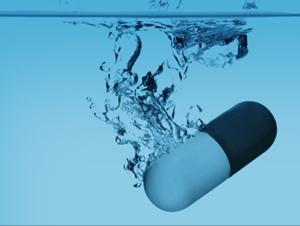Pharmaceutical flushing
According to an investigative report by the Associated Press, Americans flush a quarter of a billion pounds of drugs and contaminated packaging down the drain every year. To draw public attention to the problem, the U.S EPA and California named this: "No Drugs Down the Drain" week.
Ben Grumbles is the EPA’s Assistant Administrator for Water: "There’s growing awareness that the toilet isn’t a trashcan, and that it’s important to protect the environment and properly dispose of unwanted pharmaceuticals."
Part of the problem is the federal government’s own regulation. It requires that labels on narcotic painkillers tell people to flush unused pills down the drain. Another problem – not all drugs are fully metabolized by the body and are excreted. Still, according to the AP investigative report, most of the 250 million pounds of pharmaceuticals going down drains comes from the nation’s hospitals and long-term care facilities. Whatever the source, the EPA’s Ben Grumbles says, the drugs can eventually wind up in our drinking water:
"For decades, pharmaceuticals in very tiny trace amounts have been sent to wastewater plants and may also appear in lakes and streams at extremely small amounts in the parts per trillion."
These amounts are in minute concentrations, but these are some very toxic and very powerful drugs — anti-cancer drugs, antibiotics, drugs that mimic hormones — in fact, drugs that are hormones.
According to Grumbles: "Well, we know several things. One is that in therapeutic doses, those types of contaminants could pose a risk to the environment, to fish and wildlife, which can be very sensitive. We are very concerned about potential impacts on aquatic life. We know enough, we have enough information, to know that there are actions we can take. And one very important action we’re taking is to significantly expand the scope of the science and the surveys to see just how much of these tiny, truly tiny trace amounts are in the environment. But the really key part is to get new information, as much as we can, on whether there are any risks to human health. And the most important thing right now is to be spreading the word about proper disposal of pharmaceuticals. The toilet is not a trashcan. And also working with communities providing grants or outreach and awareness programs so that there can be community collections, take back programs for unused and unwanted pharmaceuticals."
Hosted by Steve Curwood, "Living on Earth" is an award-winning environmental news program that delves into the leading issues affecting the world we inhabit. More "Living on Earth.
